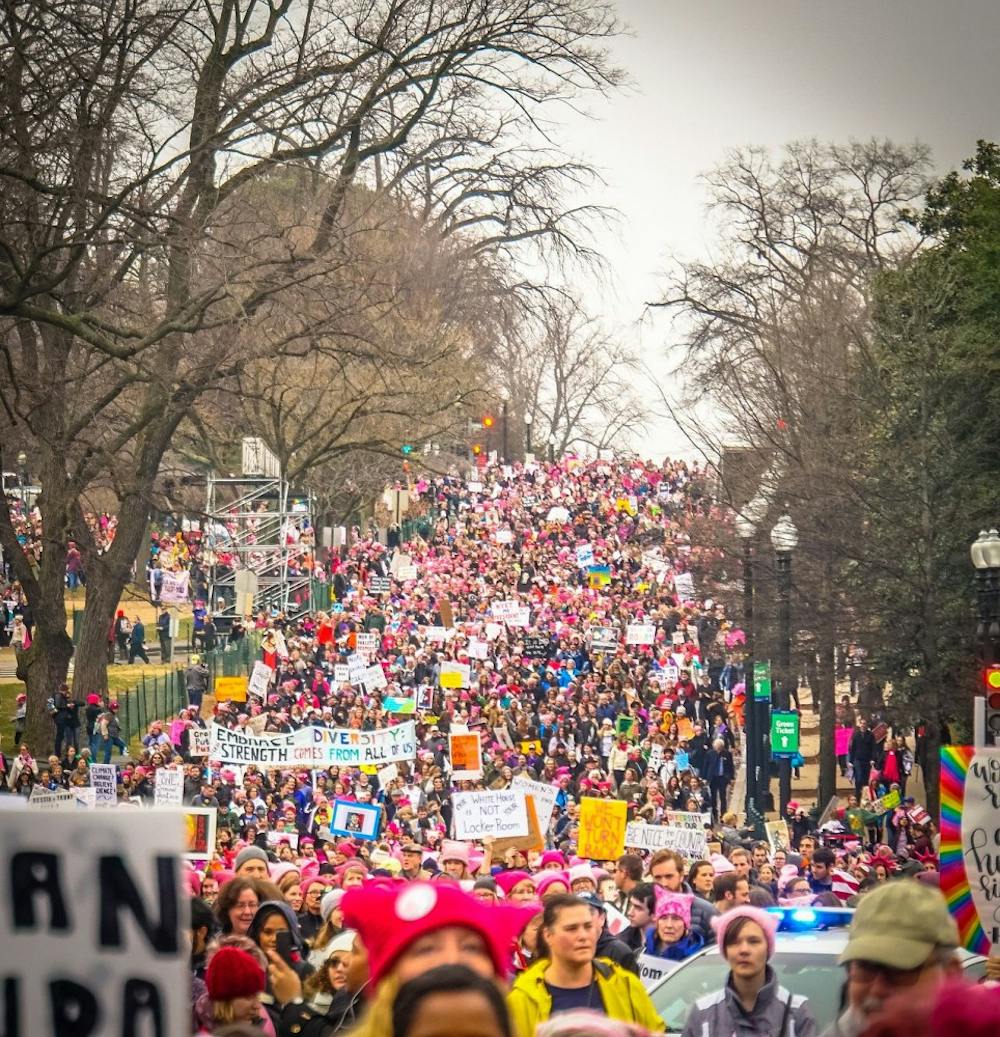Now, more than ever, it's important that Penn continues to push for change. Activism at Penn takes many forms—but the students below are fired up and ready to go.
Esther Cohen (C‘18) and Du’aa Moharram (N‘19) organized an interfaith bus of Muslim and Jewish students to attend the Women's March in Washington, D.C. They worked with the rabbi, chaplain and a helpful bus company to secure a ride and ended up traveling with over 30 people. Esther says that the 30 students “were there as a show of solidarity from [Trump’s] alma mater. The goal of the rhetoric of Republicans right now is to tear people apart and to instill fear, especially when it comes to Islamophobia.” The group went to D. C. to show that although they are “religious minorities in this country that could be pitted against each other, but [they’re] not going to allow that to happen.”
Du’ua is the political chair for the Muslim Student Association (MSA), and since Trump’s election, she's been trying to steer the MSA towards becoming more politically involved. “In the past the MSA has been an apolitical organization," she says. "And while I respect that decision in the past, personally I don’t agree with it." In the current political climate, Du’aa sees the MSA as a potential catalyst for social justice, saying that she’s “looking forward to tackling issues of racism within the Muslim community, issues with religious minorities, and developing strong partnerships with other student organizations.”
Du’aa says she also looks forward to partnering with different minority groups.
"It’s going to be crucial for student organizations to band together," she says. "We’re gonna need it.”
Julia Pan (C‘19) is part of Lambda Alliance, the undergraduate queer advocacy group. “As political chair [of Lambda], I serve as a representative for the queer community,” she says. Julia has represented Lambda in meetings with faculty, advocating for interests of the queer community. It hasn’t been easy work, but Julia seems hopeful. “We’re talking to Amy Gutmann about getting gender neutral bathrooms in every new building,” she says.
In light of our new president, Julia asserts that “Lambda is not taking a position on Trump. However, we want an administration that champions LGBTQ rights, and the elimination of the LGBTQ rights page on the White House website does not bode well.” Going forward, the Penn LGBT Center is a hub for students organizing resistance plans (check out this event Friday!) and people who are working to make Penn a safer space for queer students.
Miru Osuga (C’18) agrees with Du’aa and Julia’s calls for unity. She says that “as the years go on, I hope that these spaces can help push an agenda of activism and awareness,” referring to many of the minority groups on campus. She is one of the founders of Spice Collective, a “group that focuses around Asian American womanhood. It’s a retreat that is coupled with bi–weekly discussions...We’ve gathered a lot of energy and people who are actively fighting for justice.” She adds that “students now have a hunger for these discussion–oriented spaces that require them to think critically about their identities and positionality, not only at Penn, but in greater social structures that surround us. Activism follows an awareness of who we actually are.”
Rhea Singh (C ‘17), an organizer for the feminist art collective We Are Watching, emphasizes the impact raising awareness can have on a movement. We Are Watching garnered attention, enough to inspire articles in Teen Vogue and BuzzFeed, after the group pasted flyers of Oz emails across campus. The momentum allowed We Are Watching to continue as a group that engaged in very public displays of activism and art. Rhea says that activist culture at Penn is changing. “Activists at Penn are very polite, but we are at an inflection point where that is starting to change. SOUL really pioneered us with their public demonstrations, like the ‘slave auction’ in front of Phi Delt, and the Ferguson chains on the Button, so they definitely set a precedent that [We are Watching] followed up last fall.” Rhea also notes that since Trump’s election, activist communities at Penn are communicating together in new ways to create change.
Aiden Castellanos (C‘19) is a Penn student whose activism goes beyond this institution. He’s involved with Penn Non–Cis, a group that educates students on trans issues and how to support trans students and with Civic House. Aiden says “social justice isn’t necessarily addressed as much as it could be” at Penn, so his work has been to educate others and “get folks in connection with outside activists in the community" Aiden works extensively with national organizations, like the Gender and Sexuality Alliance (GSA) Network, which focuses on queer and racial justice in youth communities, and Juntos, a Philadelphia–based organization that pushes for immigration activism.
“It’s important to know that there’s so much more going on than what’s immediately around me,” says Aiden. “I need to be able to use what I’m doing at Penn intelligently. There’s a lot here and I want my work to reach out.”







